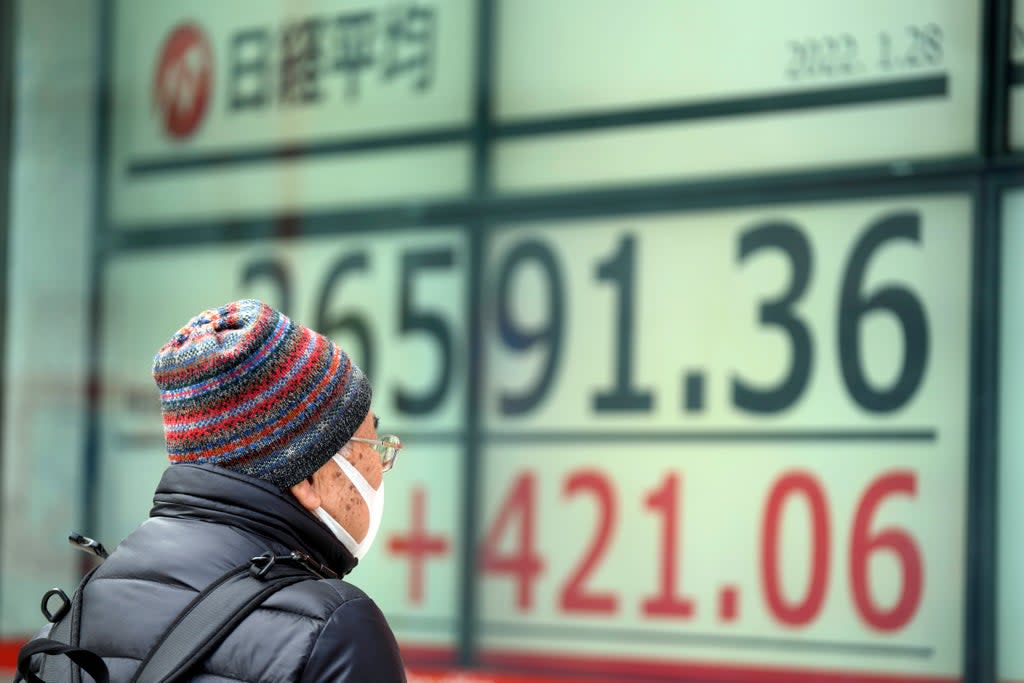Asian stocks advance after Wall Street sinks for third day

Asian stock markets rose Friday as traders looked ahead to data on U.S. employment costs that might influence Federal Reserve decisions on planned interest rate hikes.
Shanghai Tokyo and Seoul gained. Hong Kong declined.
Wall Street fell for a third day Thursday after the U.S. government reported the economy grew by 5.7% last year, its strongest annual rate since 1984.
Investors looked ahead to U.S. data on employment costs for indications of when and by how much the Fed might raise interest rates to cool surging inflation. Investors expect at least four rate hikes this year after Fed officials said stimulus that is boosting stock prices would be wound down sooner than previously planned.
The Employment Cost Index is expected to show the price of labor rose by about 1.2% over the previous quarter in the final three months of 2021.
“Another strong wage gain could amplify market expectations” of an unusually large rate hike of 0.5 percentage points as early as March, Anderson Alves of ActivTrades said in a report.
The Shanghai Composite Index rose less than 0.1% to 3,396.07 while the Hang Seng in Hong Kong sank 0.8% to 23,606.45.
The Nikkei 225 in Tokyo surged 2.1% to 26,731.91, recovering most of its losses from the previous day's 2.5% slide.
The Kospi in Seoul rose 1.4% to 2,650.23 while Sydney's S&P-ASX 200 advanced 2.3% to 6,993.80.
India's Sensex opened up 1.1% at 57,883.16. New Zealand declined 1.6% while Southeast Asian markets rose.
On Wall Street, the benchmark S&P 500 index fell 0.5% to 4,326.51 after official data showed the U.S. economy grew 5.7% last year, its strongest rate since 1984's 7.2% jump.
The index is within 10 points of entering a correction, meaning a drop of 10% from its Jan. 3 all-time high.
The Dow Jones Industrial Average slipped less than 0.1% to 34,160.78. The Nasdaq composite dropped 1.4% to 13,352.78.
Stocks have been on a roller coaster ride this week as investors try to figure out what the Fed will do after Powell said inflation pressures aren't easing.
“The Fed got inflation wrong and the scramble to deliver interest rate hikes this year is sending the best performing assets during the pandemic tumbling,” Edward Moya of Oanda said in a report.
Companies that rely on consumer spending and banks sank. Royal Caribbean fell 6.3% and JPMorgan Chase slid 1.8%.
Technology stocks lost ground. Pricey tech companies and other growth stocks are less attractive when rates rise. Nvidia fell 3.6%.
In energy markets, benchmark U.S. crude rose 48 cents to $87.09 per barrel in electronic trading on the New York Mercantile Exchange. The contract fell 74 cents on Thursday to $86.61. Brent crude, the price basis for international oils, advanced 40 cents to $88.57 per barrel in London.
The dollar gained to 115.42 yen from Thursday's 115.31 yen. The euro advanced to $1.1151 from $1.1142.

 Yahoo News
Yahoo News 
